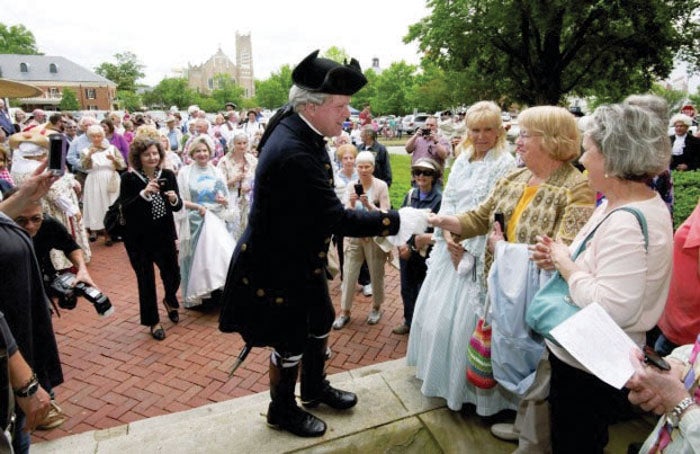Clyde, Time Was: We knew our history
Published 12:08 am Sunday, October 8, 2017

- Lynn Bull portrays George Washington to commemorate the 225th anniversary of his visit to Salisbury in a 2016 program sponsored by the Rowan Museum. File photo
Time was, we knew North Carolina history. If you knew Claude Pickett, or you know James Lloyd, Terry Holt and Susan Waller, then you know about our state.
We never memorized all 100 county seats, but we knew the state flower, bird, motto and rock. The Plott hound came later as the state dog.
We toasted, “Here’s to the land of the long leaf pine,” and we sang in the auditorium in rows: “Carolina, Carolina, heaven’s blessings attend her, where we live we will cherish, protect and defend her. Hurrah, hurrah, the Old North State forever.”
The good ol’ North State was not only on every bulletin board with thumb tacks for all the cities and towns, and strings of yarn going out to all the products, but we had a field trip to the museum with the big flag over the mantle and the staircase that we couldn’t use to go to the attic, which was all we wanted to see.
They had clothes from the midgets from the Sparks Circus, the tool to tighten the ropes on the bed so the bed bugs wouldn’t bite. We rode the bus under the railroad track on South Main Street to a cemetery and saw trenches and statues in memory of people who died. We didn’t know or care that they weren’t from North Carolina.
We learned about towns with two names: Rockwell, Woodleaf, Granite Quarry, Bear Poplar. The museum had a piece of the poplar where Thomas Cowan shot the bear. We drooled over Mr. Hubbard’s arrowhead collection.
They even had a sprig of jasmine from Jefferson Davis’ funeral train. It finally disintegrated — the flower, that is. They never told us, or maybe we forgot, about the Confederate states’ military prison. Maybe they were ashamed of it, like they are today.
Jethro Rumple, who wrote the first actual history of Rowan County in 1888, never mentioned the prison, although he was a witness at the trial of the commandant.
Later on, James Brawley, a true Southern gentleman, and George Raynor, a Long Island Yankee, came to work at “the paper.” We had to work on George, but we finally straightened out his dry wit (criticisms).
Where people came from was important. The Knox family tree drawings in the library make you wonder which limb you could be on or which leaf. Some families need self-pruning.
Michael Brown, who build the oldest house this far west in North Carolina, has myriad descendants out of the 175 billion people who have been born on this ol’ Earth ’til now.
School books told us about Andy Jackson. They left out the bawdy parts. Or General Greene, who drug through and left Capt. Daniel Little here to name the Old English Cemetery. Betsy Brandon, south of town, was actually too old to be a “little girl” who fed President Washington on his Southern tour in 1791.
We had a state flag in the classroom. Where is one in your life today? Now it’s to the point you would not carry a flag of any kind down the street for fear of being labeled radical. We played our favorite game of “steal the flag” for hours running to protect “our flag.”
Plantations and ferry boats along the river conjured up a picture of ol’ folks at home in Carolina with the Longs, Hannahs, Bringles and Stokes crossing the Yadkin to pick cotton for the McConneaugheys, Cowans and Chambers. Who traces their genealogy or inherits their names?
Some N.C. history may need a rewrite, but we learned to respect our leaders at our capital in Raleigh. We never had seen tobacco growing, but we went to a cigarette factory and the Duke Chapel.
Today we couldn’t get together for a game of tiddlywinks without taking sides. Protests, riots and questioning the “United States” do not make for an indivisible union. Secessionists rallied in 1861 behind Gov. John Ellis’ answer the Lincoln’s call for troops when he said, “You’ll get no troops from North Carolina.”
Ellis Street is still here, honoring him, and we don’t need to change that name. Charlotte was a “hornet’s nest.” Even before that, maybe DeSoto himself came through Fort Juan Pardo. Recently, “historians” think the Lost Colony may have moved to Hatteras and survived there. We keep on.
If you don’t have a history, what can you learn? Salisbury is nothing but “historical” and the envy of others. Be an original, stand out in a crowd, but don’t be divisive. Be proud of your heritage.
Whichever continent, nation or state and its history, call it sovereignty or states’ rights, but we always thought we were better off than South Carolina — especially when we drove on those bad roads to the beach through swamps and tall pines that gave us tar, pitch and turpentine. Go, Carolina.

